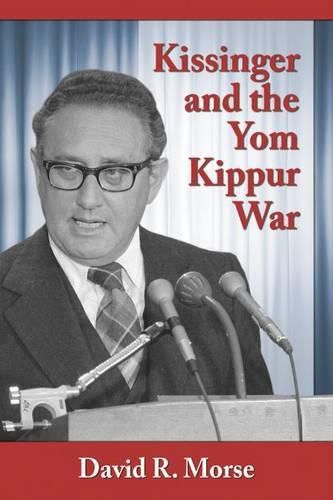Readings Newsletter
Become a Readings Member to make your shopping experience even easier.
Sign in or sign up for free!
You’re not far away from qualifying for FREE standard shipping within Australia
You’ve qualified for FREE standard shipping within Australia
The cart is loading…






This title is printed to order. This book may have been self-published. If so, we cannot guarantee the quality of the content. In the main most books will have gone through the editing process however some may not. We therefore suggest that you be aware of this before ordering this book. If in doubt check either the author or publisher’s details as we are unable to accept any returns unless they are faulty. Please contact us if you have any questions.
The 1973 Yom Kippur War marked a turning point in the special relationship between the United States and Israel. While previous U.S. administrations had taken an even hand in the Middle East, the action saw American support of Israel become unconditional. A massive airlift of military hardware to Israel brought the U.S. and the Soviet Union closer the conflict.
As the war-just two weeks in duration-played out along the Suez Canal, U.S. Vice President Spiro Agnew was forced to resign amidst bribery allegations. Watergate crescendoed, resulting in President Nixon’s mental near-breakdown. Despite Secretary of State Henry Kissinger’s efforts to supply arms to Israel, he was stymied by resistance in the State Department, which some saw as threatening to result in an Arab victory. Ostensibly a U.S. foreign policy success, the war led directly to the 1974 oil crisis and a permanent rift in U.S.-Israeli relations.
Drawing on Kissinger’s telephone conversations and other recently declassified documents, this book tells the story of how the secretary became the chief architect of America’s Middle East policy, and how his Cold War strategy played a critical role in the decision to pursue active military involvement.
$9.00 standard shipping within Australia
FREE standard shipping within Australia for orders over $100.00
Express & International shipping calculated at checkout
This title is printed to order. This book may have been self-published. If so, we cannot guarantee the quality of the content. In the main most books will have gone through the editing process however some may not. We therefore suggest that you be aware of this before ordering this book. If in doubt check either the author or publisher’s details as we are unable to accept any returns unless they are faulty. Please contact us if you have any questions.
The 1973 Yom Kippur War marked a turning point in the special relationship between the United States and Israel. While previous U.S. administrations had taken an even hand in the Middle East, the action saw American support of Israel become unconditional. A massive airlift of military hardware to Israel brought the U.S. and the Soviet Union closer the conflict.
As the war-just two weeks in duration-played out along the Suez Canal, U.S. Vice President Spiro Agnew was forced to resign amidst bribery allegations. Watergate crescendoed, resulting in President Nixon’s mental near-breakdown. Despite Secretary of State Henry Kissinger’s efforts to supply arms to Israel, he was stymied by resistance in the State Department, which some saw as threatening to result in an Arab victory. Ostensibly a U.S. foreign policy success, the war led directly to the 1974 oil crisis and a permanent rift in U.S.-Israeli relations.
Drawing on Kissinger’s telephone conversations and other recently declassified documents, this book tells the story of how the secretary became the chief architect of America’s Middle East policy, and how his Cold War strategy played a critical role in the decision to pursue active military involvement.